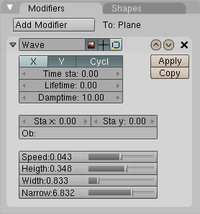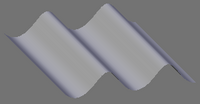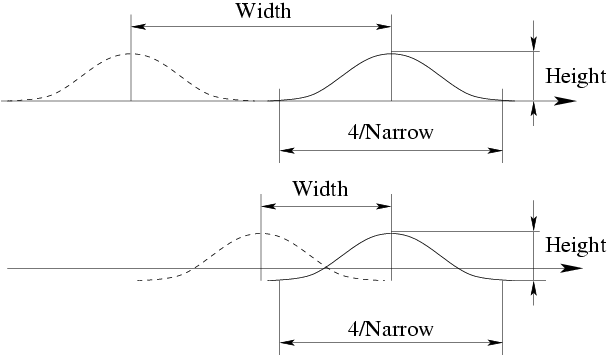Manual/Wave Modifier
From BlenderWiki
< Manual
User Manual: Contents | Guidelines | Blender Version 2.4x
Contents[hide] |
[edit]
Wave Modifier
Mode: Object Mode
Panel: Editing Context → Modifiers
Hotkey: F9
[edit]
Description
The Wave effect adds a wave motion to the Z co-ordinate of the Object Mesh.
[edit]
Options
This panel is found in the Editing buttons, Modifier panel, selecting Wave as the modifier.
- X and Y
- The Wave effect deforms vertices in the Z direction, and originates from the given starting point and propagates along the Mesh with circular wave fronts, or with rectilinear wave fronts, parallel to the X or Y axis. This is controlled by the two X and Y toggle buttons. If just one button is pressed fronts are linear, if both are pressed fronts are circular.
- Cycl
- Repeats the waves cyclically, rather than a single pulse.
- Time sta/Time end
- The Frame at which the Wave begins (if Speed is positive), or ends (if Speed is negative).
- Lifetime
- The number of frames in which the effect lasts.
- Damptime
- An additional number of frames in which the wave slowly dampens from the Height value to zero. The dampening occurs for all the ripples and begins in the first frame after the Lifetime is over. Ripples disappear over Damptime frames.
- Sta X and Sta Y
- The starting points of the waves, in the Mesh object's Local coordinates.
- Ob
- Use an Object as reference for starting position of the wave. Leave blank to disable.
- Speed
- The speed, in Blender units per frame, of the ripple.
- Height
- The height or amplitude, in Blender units, of the ripple.
- Width
- The width, in Blender units, between the tops of two subsequent ripples (if Cycl is enabled). This has an indirect effect on the ripple amplitude - if the pulses are too near to each other, the wave may not reach the z=0 position, so in this case Blender actually lowers the whole wave so that the minimum is zero and, consequently, the maximum is lower than the expected amplitude. See Technical Details below.
- Narrow
- The actual width of each pulse, the higher the value the narrower the pulse. The actual width of the area in which the single pulse is apparentis given by 4 divided by the Narrow value. That is, if Narrow is 1 the pulse is 4 units wide, and if Narrow is 4 the pulse is 1 unit wide.
[edit]
Technical Details
The relationship of the above values is described here:
[edit]
Hints
To obtain a nice wave effect similar to sea waves and close to a sinusoidal wave, make the distance between following ripples and the ripple width equal, that is the Width value must be equal to 2 divided by the Narrow value.
|




